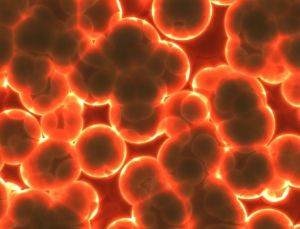The microbiota-gut-brain axis and its potential role in infection and behavior
By Katherine Shagoury
 Bacteria are not just bugs, said Mark Lyte, PhD, MT (ASCP), who presented at the Integrative Healthcare Symposium Pre-Conference in New York City. Rather, bacteria are neuroendocrine organisms that want to survive and interface. But what does that mean for the complex understanding of infectious disease, diet, and the microbiota-gut-brain axis? By looking at bacteria from this new perspective, practitioners can develop new ways to approach the microbiome when it comes to overall health and management of disease.
Bacteria are not just bugs, said Mark Lyte, PhD, MT (ASCP), who presented at the Integrative Healthcare Symposium Pre-Conference in New York City. Rather, bacteria are neuroendocrine organisms that want to survive and interface. But what does that mean for the complex understanding of infectious disease, diet, and the microbiota-gut-brain axis? By looking at bacteria from this new perspective, practitioners can develop new ways to approach the microbiome when it comes to overall health and management of disease.
Microbial endocrinology is microbiology and neurology combined, said Lyte, who began researching the influence bacteria can have on the immune system and brain over 25 years ago. In his research, he looked at whether or not stress affects a person’s immune system. He found that mice who were exposed to bacteria in a stressful environment—after an injury or cut, for example—were immune enhanced by over 500 percent. This is because the immune system responds quickly and in a heightened state to resolve the infection, said Lyte.
While the immune system saw a better response with the presence of bacteria, the stressful environment still led to faster death. There’s a lot of confusion in the scientific community, which concludes bacteria is good for you but stress is bad for you. However, more scientists are starting to understand that stressed bacteria, not the immune system, are responsible for causing infection, and that overall health has more to do with bacteria in the gut. This prompted Lyte to look closer at the bacteria and how it interacts with the rest of the body.
There are over 100 trillion microbes in a human being. Microbial cells are 10 times more numerous than human cells in the human body—90 percent of the cells in the human body are microbes. Approximately 500-1000 microbial species occupy the human gut. The microbes perform vital functions for the human host. Without these microbes, the gut immune system fails to develop. Harmless bacteria are needed to compete with harmful bacteria for space and nutrients—these bacteria degrade dietary fiber into short-chain-fatty-acids, which then can be absorbed.
The composition of the microbiota community is important because some species are highly inflammatory whereas other species are anti-inflammatory. In almost all human cells there are pattern recognition receptors that recognize “foreign” molecules. Some foreign molecules belonging to bad bacteria will result in inflammation, which gets communicated by the vagus nerve to the brain resulting in anxiety, depression, and other negative moods.
The composition of the gut microbiota determines more than depression and anxiety levels. Gut microbiota influence appetite, obesity levels, insulin resistance (type 2 diabetes), and memory. In a demonstration, researchers transferred the gut microbiota from the obese mice to the thin mice. The thin mice then got fat, even though they had not increased their calorie consumption.
“Microbes in the gut don’t rely on simply the dietary foods you give in terms of the nutritive elements,” he said. “[Bacteria] also involve other aspects for their survival and they need to know where they are and what they do.”
Cell-to-cell signaling first evolved in bacteria. Bacteria, in fact, uses the same signaling that human cells do, to a degree, and providers may be able to utilize that to benefit the patient’s health and treatment of disease, said Lyte.
The two major influences on microbiota composition are stress and diet. Stressors will increase the release of stress hormones in the gut which will then alter the microbial colonies and provoke systemic inflammation. Beyond changing the colonies of microbiota in the gut, stress will also alter the connections between the cells lining the gut, so the lining becomes more permeable to pathogens and to secretions from these pathogens, further contributing to systemic inflammation.
Eating fermented foods such as sour kraut and yogurt is good strategy for encouraging the colonization of good microbes in the gut. Fermented food substance are called probiotics. Fermented foods contain the good bacteria. For increasing good bacteria in gut, there’s also the prebiotic strategy. Rather than consuming beneficial bacteria directly, prebiotics is about consuming dietary nutrients that will promote the survival of beneficial microbes. While probiotics and prebiotics can potentially influence microbiota composition so that anxiety and depressive behaviors are reduced, other dietary factors will probably reverse the effect. Consequently attending to the entire diet is necessary if a positive effect is to be achieved.
















